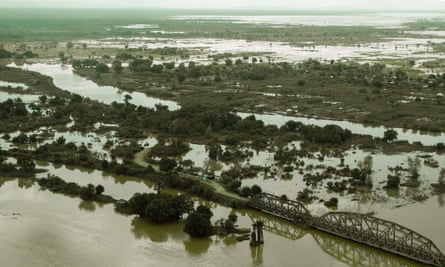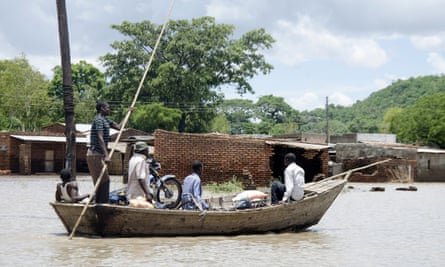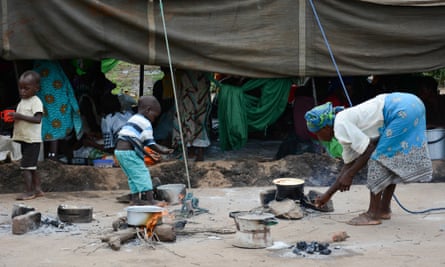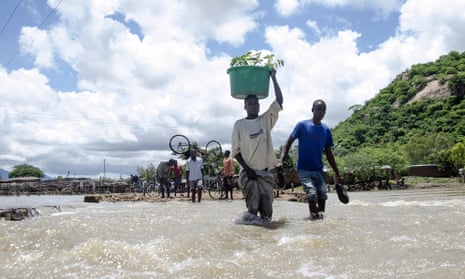Homes swept away like matchsticks, vast plains turned to mud, fields of precious crops drowned. An aerial view from a helicopter, rain hammering on its roof after delivering food aid, reveals the full devastation wreaked by Malawi’s worst floods for half a century.
Villagers here speak of climbing up anthills or trees and waiting for three days without food or water, drenched in rain and fearing attack by crocodiles. Families describe how they have lost everything. Rescue workers tell of seeing children swept to their deaths and picking up floating backpacks only to discover corpses attached. Nearly three weeks on, the death toll remains unclear and not everyone is accounted for.
The disaster has led to accusations that the Malawian government’s response is being hampered by the decision of Britain and other donors to freeze direct aid following the so-called “cashgate” corruption scandal that engulfed several senior officials. Western donors have channelled support to NGOs on the ground instead.

Among five helicopters delivering food and other supplies was a South African-owned Bell 205 that, its pilots said, flew in the Vietnam war. As the engine roared and raindrops swam up the windscreen, passenger Duncan Goose looked out on a scene of destruction. The murky Shire river had burst its banks, burying maize fields in silt, swamping flimsy wooden structures, snapping bridges and leaving mudbrick homes roofless or ruined. Entire villages have been wiped off the map and communities forced to relocate.
After the helicopter swooped through a lush green valley and touched down, Goose, the founder of One, a UK-based philanthropic business that funds clean water programmes for communities in Malawi, said: “Tragic doesn’t even come close. How can you restart your life when you can’t even afford a saucepan, let alone rebuild a home?”
Estimates of the death toll from the torrential rains vary from 79 to more than 200. At least 174,000 people have been displaced and 638,000 affected, according to the UN, with livestock and possessions swept away, subsistence crops lost and water sources contaminated.
There are fears of an outbreak of cholera or other waterborne diseases, while people without shelter are at greater risk of malaria. Roughly 200 camps for displaced people have sprung up, but the UN’s World Food Programme says it urgently needs $18m (£12m) to continue food assistance.
Among the survivors is Elen Zinoidha, a 67-year-old great-grandmother from the village of Masanduko, south of the commercial capital, Blantyre. When the relentless downpour began nearly three weeks weeks ago, she saw water creeping towards her home. She and a neighbour ran to an anthill and climbed to the top, an estimated 7ft in height, where they were part of a group of five adults and five children. They spent the next three days there in the rain, sitting upright because there was no space to lie down, barely able to sleep and with nothing to eat or drink.
“There was a dog seeking refuge on the edge of the anthill,” recalled Zinoidha. “A crocodile caught the dog, so that brought fear over whether we’d survive. When a crocodile is hungry it could climb up the anthill and grab one of us. We were overtaken by this fear so we didn’t feel hunger or thirst for three days. We were just praying to God for mercy and support.”
Finally the group spotted some people in canoes. “We pleaded with them to rescue us but they were not keen, so we had to lie that one of the children was sick. They took us but there were some waves and the canoeist had to paddle carefully to not capsize.”
Zinoidha made it to higher ground and is now in a camp for displaced people, where she says life is tough. At home, the maize, cowpea, beans, rice and tomato she was growing have been submerged in mud.

About 70 people took refuge at the Salvation Army church in the village of Osiyana and crowded on to the pulpit. Pastor Amos Zikatiwindu, 36, and his wife were at home and clung to the roof trestle as the waters poured in. “I saw my wall fall down, and another wall fall down, so we had no option but to look for Jesus. We prayed for sand and God answered and sand entered the house. We stepped down from the trestle and the water was up to our necks. I took a rope and threw it to my wife.”
When the pair escaped, there were people crying outside, assuming they had perished. The church had also collapsed, leaving everyone exposed for three days without food or water. Eventually they were removed to safety by helicopter.
Rescuers in boats had to combat driving rain and little infrastructure to reach survivors, many of whom were clinging to trees and begging to be saved. Percy Phiri, a police officer, found a woman holding on to the top of her house with water up to her waist, shouting: “Please help me!” Others were stranded in a church in waist-high water.
Phiri, 31, said: “You could see bags in the water. You picked it up and there was a body attached. People were hanging in trees and were then washed away. A headteacher’s wife and son were found hanging on a tree. I saw more than 10 bodies, most of them children. It was terrible. When I sleep, I still have a vision of them.” In one incident, he added, a boat capsized with 14 adults and five children. None survived.
Malawi’s president, Peter Mutharika, has said the damage will cost 23.9bn kwacha (£34m) and declared half the country a disaster zone. His government has been working alongside the UN and NGOs on recovery efforts, but some believe its response has been too slow, citing western donors’ suspension of direct aid, which made up 40% of the national budget.
The decision in 2013 to freeze direct aid followed the “cashgate” affair in which leading officials were arrested and accused of exploiting a loophole in the government’s payment system to divert millions into their own pockets.
Masauko Mthunzi, programme manager for water, sanitation and hygiene at the relief organisation Concern Universal, said: “The government has been impacted so it’s not able to respond to the needs as quickly or on the scale they should have. It’s got the structures but the response was generally a bit weak and slow and the delivery of supplies has been slow. I believe the response from government would have been much better if they had all the necessary resources.”
It took only 12 hours, however, for Concern Universal to get the nod from Britain’s Department for International Development for urgent funding. Unicef, the UN children’s agency, has also received contributions from Britain, the EU and other donors towards its £9.6m budget for the relief effort.

Mahimbo Mdoe, the country manager at Unicef, warned that basic social services have broken down in affected areas, while in the camps there are unconfirmed reports of rapes and other assaults. “People say there hasn’t been anything this bad since 1964 and the area is quite immense. There are stories of disease outbreaks and communities that have still not been found. There is a need for a huge upscale to reach the 174,000 displaced.”
At one camp in the village of Bangula, up to 14 people crowded into tents intended for 10. Camp monitor Chancy Kalolokesya, from ActionAid, said: “There is not enough shelter. Some people sleep in the open … because we don’t have enough tents. There is a food problem: we don’t know when the next supply will come. Not everyone has received a blanket or mat to sleep on. In terms of kitchen utensils, we have shortages of everything.”
But some victims live in such remote locations that they have been unable to reach camps or receive official help. Tiyanjane Rodrich Lino, 20, is nursing a swollen jaw after her house of mud and straw collapsed on her while she slept. Her family in Namacha village carried her over a river where the bridge had collapsed and helped her make the three-hour walk to hospital, where only Panadol was available, then walk back.
Their home now lies in a heap of mud and dried grass, so the family are among 36 villagers crammed into a tent that was previously provided by a donor in Pembrokeshire, south-west Wales, and which first saw service during the second world war. About 150 people enthusiastically helped erect the tent in an hour.
Residents of several villages interviewed by the Guardian said they had never seen such rains in their lifetime. But Baton Garden, 90, who married eight times and has more than 60 children and grandchildren, can remember something worse: an invasion of locusts in 1939. “They damaged the crops more than the rain,” he mused, sitting near the ruin of his house. “You could not see the leaves, you could not see something green.”

Comments (…)
Sign in or create your Guardian account to join the discussion